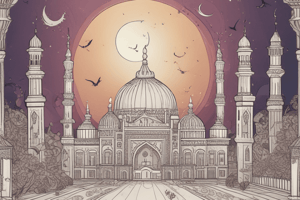Podcast
Questions and Answers
What is the meaning of the word 'Ramadan'?
What is the meaning of the word 'Ramadan'?
- Scorching heat or dryness (correct)
- New crescent moon
- Intense spiritual heat felt during fasting
- Physical thirst due to fasting
During Ramadan, what practice involves abstaining from eating and drinking from dawn until sunset?
During Ramadan, what practice involves abstaining from eating and drinking from dawn until sunset?
- Tarawih prayer
- Fasting (correct)
- Feeding the poor
- Tahajjud prayer
Which tradition involves families gathering to share an evening meal after sunset during Ramadan?
Which tradition involves families gathering to share an evening meal after sunset during Ramadan?
- Eid al-Fitr celebration
- Iftar (correct)
- Tahajjud prayer
- Tarawih prayer
What is a primary purpose of Ramadan for Muslims?
What is a primary purpose of Ramadan for Muslims?
Aside from fasting, what practice is specifically observed only during Ramadan?
Aside from fasting, what practice is specifically observed only during Ramadan?
'Tafseerul Qur’aan' is a special lecture during Ramadan that focuses on:
'Tafseerul Qur’aan' is a special lecture during Ramadan that focuses on:
Flashcards are hidden until you start studying
Study Notes
Ramadan – A Month of Fasting and Spiritual Renewal
Meaning of Ramadan
Ramadan is a month observed by Muslims worldwide. It starts with the sighting of the new crescent moon and ends with the first sighting of the next full moon. The word 'Ramadan' comes from the Arabic root word 'ramida', which means scorching heat or dryness. This could refer to the intense spiritual heat felt during this period or the physical thirst experienced due to fasting.
Practices During Ramadan
Muslims observe several practices during Ramadan. Firstly, they abstain from eating and drinking from dawn until sunset. Next, they recite specific prayers, including the Tarawih prayer and Tahajjud prayer, which are only performed during Ramadan. Many also engage in additional good deeds such as feeding the poor and giving charity. Additionally, some may attend special lectures called tafseerul Qur’aan to study the meanings behind verses in the Holy Qur'an.
Traditions of Ramadan
One prominent tradition during Ramadan is breaking the fast daily after the sun sets. This involves families gathering together to share an evening meal known as Iftar. Another important ritual is Eid al-Fitr, celebrated at the end of Ramadan. On this day, people wear their best clothes, exchange gifts, participate in special prayers, and share sweets.
Importance of Ramadan
The significance of Ramadan lies in its purpose. For Muslims, it serves as a time for self-reflection and renewed devotion to Allah (God). It is believed to be the month when the Holy Qur'an was revealed to the Prophet Muhammad, making it highly reverent among all Muslims. Fastnig helps Muslims connect with others who might need help and provides an opportunity to purify one's soul.
Benefits of Observing Ramadan
Observing Ramadan brings numerous personal, social, and community benefits. At the individual level, fasting promotes restraint over desires and strengthens willpower. Socially, it fosters bonds between family members, friends, and neighbors through shared experiences and mutual support. Communally, it enhances solidarity within a society by encouraging empathy towards those less fortunate and promoting unity among believers.
Studying That Suits You
Use AI to generate personalized quizzes and flashcards to suit your learning preferences.




